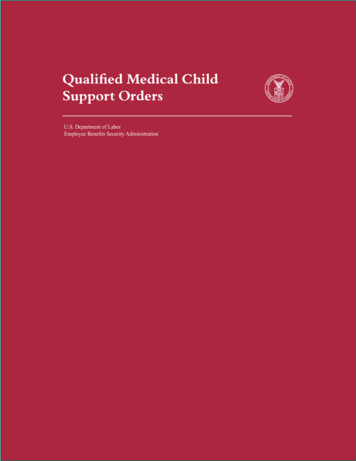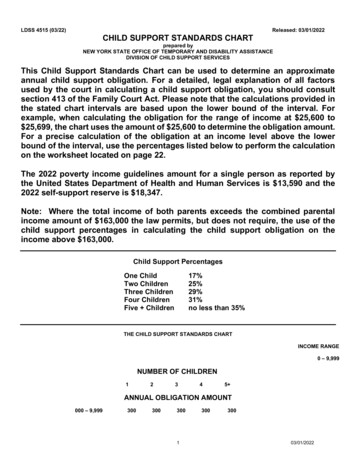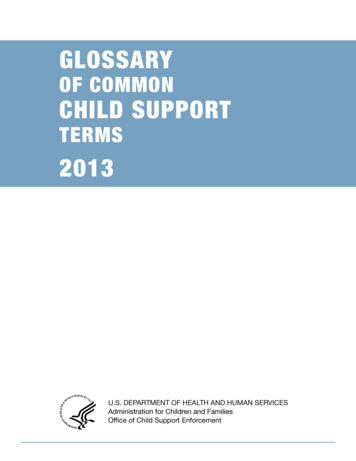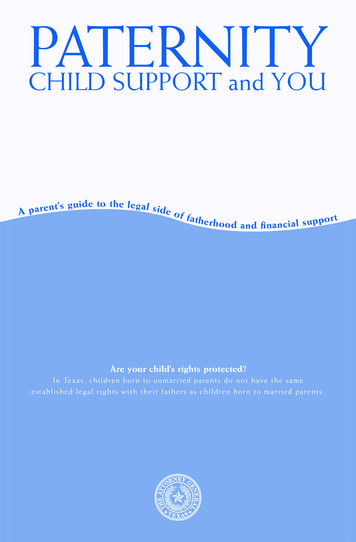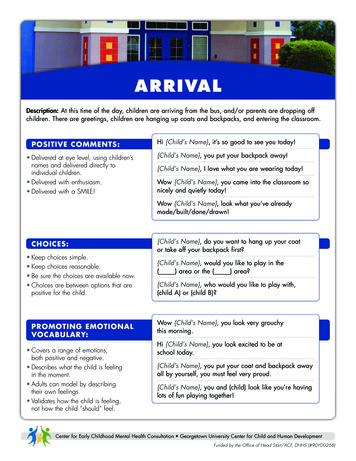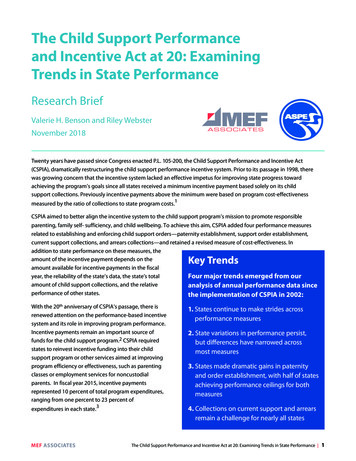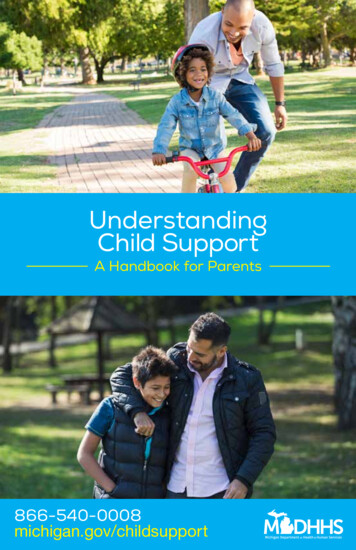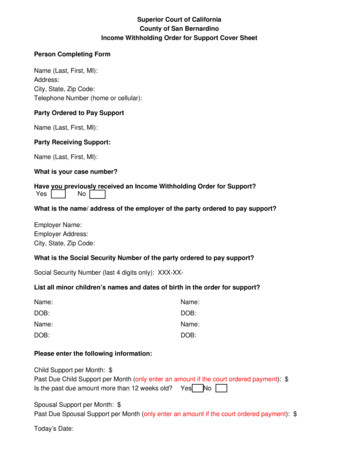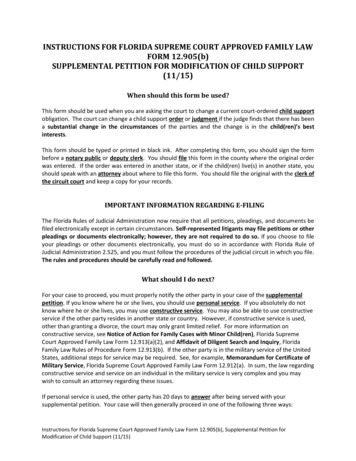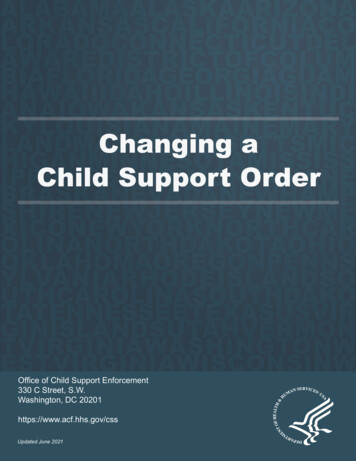
Transcription
Changing aChild Support OrderOffice of Child Support Enforcement330 C Street, S.W.Washington, DC 20201https://www.acf.hhs.gov/cssUpdated June 2021
C hangingaC hild S upport O rderOffice of Child Support Enforcement Administration for Children & Families U.S. Department of Health and Human ServicesGeneral OverviewThis guide offers information to help parents, custodians, or people who work with parents and custodians,understand the child support review and adjustment process, sometimes called a modification. It explainshow parents can ask to have their child support order changed because of a change in their financialsituation. Parents or custodial parties who want more information about this process should start with thisguide.The federal Office of Child Support Enforcement prepared this guide, consulting with the state and territorialchild support offices. If a tribal program issued an order, please check with that program. Note thatprograms evolve and may offer newer information, so check with your local child support agency forupdates.Materials include: “Changing a Child Support Order” guide “State by State - How to Change a Child Support Order” e-state-how-change-child-support-order) a map with links to modification information foreach state.This guide is available on the Office of Child Support Enforcement website. It will also be available at federalcorrectional institutions.This guide was prepared by the federal Office of Child Support Enforcement. This guide does not have anybinding legal authority and does NOT constitute legal advice. It should be a starting point for child supportinformation. You may wish to consult a lawyer before using the forms or information provided in this guide.1
C hangingaC hild S upport O rderOffice of Child Support Enforcement Administration for Children & Families U.S. Department of Health and Human ServicesOverview of the Child Support ProgramCongress created the child support program in 1975 through Title IV-D of the Social Security Act. Peopleoften call it the IV-D (“Four-D”) program. The federal Office of Child Support Enforcement (OCSE) oversees,regulates, and funds the Title IV-D program and conducts outreach. OCSE is within the United StatesDepartment of Health and Human Services, Administration for Children and Families.In every state, and also in some federally recognized Indian tribes and organizations, the IV-D agency isresponsible for providing child support services. Child support agencies are operated by state, tribal, county,or local governments according to program guidelines set forth in Title IV-D of the Social Security Act. Theagency may be located in the Department of Social Services, the Office of the Attorney General, or theDepartment of Revenue. Child support agencies help parents support their children by locating noncustodialparents; establishing legal parentage; establishing, enforcing, and modifying child support and medicalchild support obligations; and collecting and distributing child support money. They provide the day-to-dayservices to process child support cases.While child support programs vary, some may provide these services: Help parents early on to solve problemsEncourage parents to participate in establishing child support ordersEducate parents about the child support programEstablish realistic child support order amountsUse automated systems to discover missed payments as early as possibleNotify noncustodial parents about missed payments before taking enforcement actionsModify (change) a support order so that it stays consistent with a parent’s ability to payReduce that portion of child support debt owed to the government if the parent starts paying current supportPass through more support to families in public assistance cases instead of keeping it to repay thegovernment for cash assistanceApplying for child support services: Any parent or custodial party can apply for services to establish a childsupport or medical support order, collect support payments, or request their order be reviewed for possiblemodification. People who have received services under the Temporary Assistance for Needy Families (TANFor federally assisted Foster Care programs (and sometimes Medicaid, Supplemental Nutrition AssistanceProgram [SNAP], or child care programs are automatically referred for child support services. An individualcan apply for services to establish parentage – a legal relationship with his/her child. A noncustodial parentwhose case is not in the child support program can apply for services to make payments through theprogram. Parent's or custodial party can apply through the local, state, territory, or tribal child support agency.Usually, applying to the local child support agency is most effective.Asking for a review or modification: Either parent or custodial party can ask to have a child support orderreviewed at least every three years or whenever there is a substantial change of circumstances (such as lossof employment or incarceration), to make sure that the order remains current. When parents have asignificant change in their financial situation, and they have a case with a child support agency, it is importantto contact that child support agency as soon as possible to make sure that the child support order accuratelyreflects the new circumstances.2
C hangingaC hild S upport O rderOffice of Child Support Enforcement Administration for Children & Families U.S. Department of Health and Human ServicesQuestions and AnswersWhat is the purpose of this guide?This guide offers information to help parents, custodians, and people who work with parents and custodians,understand the child support review and adjustment process, sometimes called a modification. It explainshow parents can ask to have their child support order modified because of a change in their financialsituation. Parents or custodians who want more information about this process should start with this guide.I am a parent or custodian.How do I use this guide?Find the state, territory, or tribe where you have or think you might have a child support order, and review theinformation about their specific child support program.Read the general information in this guide and use the “State by State – How to Change a Child SupportOrder” map te-state-how-change-child-support-order) tofind your state, territory, or tribe’s website with information on the modification process for that jurisdiction.Only the state, territory, or tribe that has your child support order can take any action on your case.Which child support agency should I contact?Identifying where to request a change to a child support order may vary based on state or tribal law. Start bycontacting the local child support agency handling your case. If you are not sure which state handles yourcase, then contact the nearest child support agency where you live or where your child and the custodialparent live. If you have a tribal order, contact the tribal child support program.How do I contact a child support agency?You can find contact information child-support-agencycontacts) for your local child support agency on the OCSE website. When you contact the child supportagency, it may help to provide your full name, date of birth, Social Security number, the case name or docketnumber if known, the children’s names and dates of birth, and the other parent’s known information like theiraddress and date of birth. It is important to contact your local child support agency and ask to have your orderchanged as soon as your situation changes. You will not be allowed to modify an ordered amount or pastdue amount prior to the date of your request.I work with parents or custodians.How do I use this guide?You can use this guide to talk to parents or custodians about the importance of asking to change an order.Encourage parents to act as soon as possible when their financial situation has changed. You can help themidentify and contact their local child support agencies. You can learn more about how to collaborate withlocal child support offices (see below).3
C hangingaC hild S upport O rderOffice of Child Support Enforcement Administration for Children & Families U.S. Department of Health and Human ServicesChanging an OrderMost of the information in this guide relates to changes handled by the child support program. Someparents or custodians have child support cases that are not handled by the child support program. Forexample, some parents hire lawyers to address child support in a divorce case that does not involve thechild support program. A person who has a support order not handled by the child support agency can alsofile legal papers requesting the court to review the order.How are child support orders generally changed?All states are required by federal law to have procedures for periodic review and adjustment (if appropriate) ofchild support orders handled by state child support agencies.The child support agency automatically reviews the support orders in “TANF” cases at least once everythree years. In “non-TANF” cases, the child support agency will provide notice to either parent orcustodian of their right to request a review of their child support order at least once every three years.However, either party may request a review at any time based on a substantial change incircumstances.Child support agencies conduct reviews in a variety of ways. Working with parents or custodians, they may: Review and, if appropriate, adjust the order according to the child support guidelines if the amount of childsupport under the order differs from the amount that would be awarded according to the guidelines. Apply a cost-of-living adjustment to the order according to a formula developed by the state or tribe. Use automated methods (including automated comparisons with wage or state income tax data) toidentify orders eligible for review, conduct the review, identify orders eligible for adjustment, and apply theappropriate adjustment.What is the difference between a judicial modification and an administrative modification?The method for a modification or change to a child support order may depend on the process you use and thetype of child support program in your state, territory, or tribe. Some programs can change a child support orderthrough an administrative process, which is usually less formal than a judicial procedure held in a courtroomwhere judicial officers make and enforce child support orders. Many child support programs use a courtprocess to change child support orders, while others provide multiple ways to request a change. Often, thesame method used to establish the order (administrative or judicial) is used to modify the order.If I ask to have my child support order changed, will my support amount decrease?Not necessarily. The reviewing authority will decide if there has been a “substantial change in circumstances.”If your financial situation has improved, for example, your order may be increased. If you’ve lost a job, yourorder may be decreased, but it depends on your overall income and some other factors. The court oradministrative officer makes the final decision.If I’m incarcerated, can I try to change my order?Once a child support order is established, child support agencies have varied procedures for modifying orsuspending a child support order for incarcerated parents. Federal law requires states to review an order ifthe parent makes a request and shows that there has been a “substantial change in circumstances.” Ifan individual will be incarcerated for more than 180 days, the state may automatically start a review of the childsupport order or send notice to both parents letting them know they have a right to request that the case bereviewed for modification. Contact your state or local child support agency to see if your child support order canbe changed while you are incarcerated.4
C hangingaC hild S upport O rderOffice of Child Support Enforcement Administration for Children & Families U.S. Department of Health and Human ServicesWhy is it so important to try to change my child support order? Can’t I just wait until I’mreleased?Generally, child support orders can be changed when your ability to pay changes substantially. Child supportprograms typically rely on one of the parents to request the change in amount. Child support orders may notbe reduced automatically when a parent becomes incarcerated, even if you don’t have the ability to pay yourorder anymore. That’s why it is important for you to contact your local child support agency as soon aspossible and ask for a modification to your order. If you wait until you are no longer incarcerated, you will stillowe the full amount of child support that has built up while you were incarcerated. You will not be allowed tohave your order modified retroactively or backdated, so it’s important to ask for a review and changeas soon as your situation changes. Some states also charge interest on unpaid support.For federal inmates, the Bureau of Prisons Program Statement, Inmate Financial Responsibility Program,outlines procedures for Bureau staff to help inmates develop a financial plan and monitor progress in meetingtheir obligations, including child support payments. To determine the amount owed, Bureau staff must havedocumentation like a court order or judgment, or a letter with the inmate’s obligation from a state child supportenforcement unit.What if I’m in a correctional facility in one state, but I think my child support order was issuedby another state, or my child (or their caregiver) lives in another state?When the parent that is obligated to pay child support lives in one state and the child and custodian orcustodial parent live in another, the case is called an “interstate” or “intergovernmental” case. Certain lawsapply to these cases. All child support agencies must address child support matters, including locating parents,establishing parentage, and establishment of support obligations, for children who live outside their borders.These cases may take more time to resolve because they involve more than one state or jurisdiction.This guide does not provide in-depth information about how these cases are handled. You should consult oneof the local child support offices for specific information. As a first step, contact the agency where your childsupport order is or was established. For tribal child support orders, contact the tribal child support s).What if I have more than one child support order?State and tribal guidelines, or case law, indicate how to share child support in cases with more than onesupport order, or when a parent has multiple children. Each family must receive a portion of the availablemoney. Depending on each state or tribe’s child support guidelines, having more than one support order mayprovide a reason to change the initial child support order. Ask your local child support agency for moreinformation on how to request a change to more than one order.How do local child support offices determine if an order should be changed?As part of the request form, or as the next step in the process, most agencies require a financial statement(some refer to it as a worksheet) of wages, income, and standard allowable expenses. Most agencies alsorequire a paystub or documentation of current income. Both parents should complete and return the incomeverification forms and attachments. If you don’t have the most recent wage information, the child supportagency may use previous earnings from other sources, such as reported wages or tax filings. After applyingthe updated income information to the child support guidelines, many agencies require the newly calculatedsupport amount to vary from the existing amount by a certain dollar amount or a certain percentage to enter amodified support order.5
C hangingaC hild S upport O rderOffice of Child Support Enforcement Administration for Children & Families U.S. Department of Health and Human ServicesEstablishing Orders, Parentage, and VisitationHow do states and tribes determine the initial child support amount?All states and tribes have laws or rules that establish child support guidelines to determine the child supportamount. Support guidelines are numerical formulas that the court or administrative agency uses to calculatehow much a parent should contribute to a child’s financial support based on parental income. State and tribalsupport guidelines vary. Most factor in the income of both parents. When a court or an administrative agencyinitially establishes a support order, it should set a realistic child support amount based on the parents’incomes. Contact your state or tribal child support agency for more information if you are incarcerated.What if I want to establish parentage?Under state law, a child born during marriage is presumed to be the child of those married parents. When achild is born outside of a marriage, parentage must be legally established for the child and parents to havecertain legal rights and responsibilities. Establishment of parentage in tribal communities will depend on theirown laws, codes, and customs. If you want to establish parentage for your child, contact your local state ortribal child support agency.There are a variety of ways to establish parentage: Marriage Signing a voluntary acknowledgment of paternity Court order established by: Admission Default Genetic testing AdoptionEither parent or the custodian can apply with the local child support agency to establish parentage. Onceparentage is established, a child support order can be entered. Also, the child gains legal rights and privileges,such as rights to inheritance, coverage under the parents' medical and life insurance benefits, and possibleentitlement to the parents' Social Security and veterans benefits.How do I get a genetic test?If parties are not certain who the father is, the child support agency can arrange for genetic testing. The testinvolves a cheek swab of the man, mother, and child. Genetic test results can establish the probability ofpaternity to such a high degree that they often result in a legal presumption of paternity. However, in moststates, the test alone does not automatically result in a legal establishment of paternity. Instead, the genetictest results provide evidence of paternity in legal cases. The genetic tests can also exclude a man who is notthe biological father. Inmates in Federal Bureau of Prison institutions should make arrangements with their UnitTeam to have a genetic test performed.6
C hangingaC hild S upport O rderOffice of Child Support Enforcement Administration for Children & Families U.S. Department of Health and Human ServicesWhat if I want to see my children?Visitation and custody seem closely connected to child support, although the law separates the issues.Most states factor visitation and custody arrangements into their child support guideline calculations whenestablishing the amount of child support. Custodial parents cannot legally deny visitation rights becausenoncustodial parents have failed to pay child support. Similarly, noncustodial parents cannot legally withholdchild support because custodial parents will not allow them to visit the children.Child support agencies must provide child support services but aren’t legally required to provide visitationservices, and most do not directly provide them. Your child support agency may inform you about the accessand visitation programs and other resources through the courts or other systems.DebtI have a lot of child support debt. What can I do?Arrears are child support payments that are past due. Even if your current child support order changes, youmay still have arrears, or debt. Many child support offices have programs to reduce the portion of childsupport debt you owe to the government if you start paying current support. Contact your local child supportagency and ask about debt compromise, debt forgiveness, or arrears management programs.DisabilityWhat if I get disability (SSI or SSDI) – does that affect my child support?It depends on the type of disability payments you receive. Low-income individuals who are disabled and havelimited employment history may receive Supplemental Security Income (SSI) benefits. The child supportprogram cannot use the garnishment process to collect child support from SSI payments because SSI is notrelated to employment.Disabled individuals with sufficient employment history may receive Social Security Disability Insurance(SSDI) benefits. The child support program may use the garnishment process to collect child support fromSSDI payments because SSDI is related to employment.Tribal OrdersWhat if I have a tribal child support order?At least 60 tribes operate tribal child support programs, providing services to Native American familiesconsistent with tribal values and cultures. Tribal child support programs locate custodial and noncustodialparents, establish parentage, establish child support orders, enforce orders, and offer services and referrals.Contact your tribal child support agency for more information.7
C hangingaC hild S upport O rderOffice of Child Support Enforcement Administration for Children & Families U.S. Department of Health and Human ServicesMilitary and VeteransThere are many legal resources to help current and former members of the military with child support matters. A Handbook for Military Families dbook-military-families)p- rovides information on child support for military families. Stateside Legal (https://statesidelegal.org/) - assists military members, veterans and their families in findingfree legal assistance help. U.S. Air Force Legal Assistance (https://aflegalassistance.law.af.mil/) provides general information aboutmany legal topics and a Legal Services Locator to help you find your nearest Department of Defense legalassistance office.If I’m a veteran, active, or reserve military– how do I get help modifying my order?If you are a current or former member of the military and your support order does not reflect your current abilityto pay, check with the child support agency or court to see if the order is eligible for modification. Most childsupport agencies have designated military or veteran liaisons that can help you. Some child support agenciesalso have special projects to assist homeless and low-income veterans who owe past-due child support orneed their orders modified.What if I’m an activated National Guard or US Reserves member and my income changes?When you are called to active duty, your child support order will not automatically change. You will need torequest a modification to your child support order. The procedure for seeking a modification varies among thestates. You may want to seek advice from a judge advocate, military legal assistance officer, or private attorney.What if I’m active duty and my support order has changed?The Defense Finance and Accounting Service (DFAS) needs to receive legal notice of the change becausenothing will happen automatically. If a child support agency is handling your case, that agency usually issuesthe new income withholding order to DFAS. Once DFAS receives the new income withholding order, it willchange the amount it withholds from your military pay.8
C hangingaC hild S upport O rderOffice of Child Support Enforcement Administration for Children & Families U.S. Department of Health and Human ServicesParents Who are Incarcerated in Federal PrisonI am incarcerated in a federal prison – how can their staff help me?Work with your Unit Team and let them know that you have children you must support financially. Give themany documentation about your obligations. The Unit Team can direct you to institution resources to help youlocate your child support agency. You can also contact the institution Reentry Affairs Coordinator (RAC) todirect you to resources and programs to help you with child support modifications.I reside in a federal Residential Reentry Center (RRC) – what do I need to know about childsupport?As a resident of an RRC, you are expected to pay both subsistence and child support. However, you canrequest a change to the subsistence amount to enable you to make your child support payments. When youarrive at the RRC, inform the RRC staff or counselor about your child support obligation. Also inform the childsupport agency about your release and location. The Bureau of Prisons must approve modification of thesubsistence amount collected by the RRC. If the state garnishes your paycheck while you reside at an RRC,you and your case manager at the RRC can request a modification in the amount of subsistence collected atany time during your designation to the RRC or Home Confinement.How can I make child support payments while I am incarcerated in a federal institution?Discuss your obligations with your Unit Team during initial classification and subsequent program reviews.They will enroll you in the inmate Financial Responsibility Program and include your child support obligationin developing your financial plan. Your progress in meeting that obligation will be monitored during yourprogram reviews. Normally child support payments are collected after any special assessments, court-orderedrestitution and fines, and court costs have been paid in full.Bureau of Prisons Staff Who Work With Incarcerated and Reentering ParentsI work in a federal correctional institution and would like to do more to help incarceratedparents with their child support. Where do I start?For staff in the Federal Bureau of Prisons, coordinate with your Reentry Affairs Coordinator (RAC) to discusshow you can further develop collaborations and strategies in this area. The RAC may already be in contact withthe appropriate child support agency. Many state and local institutions have successful collaborations with childsupport.I work in an RRC – how can I help residents with child support?When residents arrive at the RRC, staff should determine if they have child support obligations. You may beable to help them contact the appropriate child support agency, and encourage them to use this “Changing aChild Support Order” guide to address other questions.9
C hangingaC hild S upport O rderOffice of Child Support Enforcement Administration for Children & Families U.S. Department of Health and Human ServicesGlossaryAdministrative procedure – the method that an executive agency uses to make and enforce support orders.It is typically less formal than a judicial procedure held in a courtroom, and in which judicial officers make andenforce support orders.Administrative modification – the method an executive agency uses to modify a child support order, typicallywithout having a court hearing. (See administrative procedure)Arrears/arrearage – past-due child support payments.Change of Circumstances – the condition that indicates a need for modification of a support order.Child support agency – an agency in each of the 50 states, the District of Columbia, Guam, Puerto Rico, andthe Virgin Islands, as well as 60 Native American tribes, that handle child support cases. It’s often called the“IV-D” (pronounced “Four-D”) agency because the federal legislation that established the child support programis in Title IV, Part D of the Social Security Act.Child Support Enforcement Program – the federal, state, local, and tribal partnerships established under TitleIV, Part D of the Social Security Act to locate parents; establish paternity; and establish, modify, and enforcechild support orders.Custodial parent (CP)/ Custodian – the person who has primary care, custody, and control of a child. Somestates use the term “residential parent.” Some states use the term “custodial party” or “caretaker” if the childresides with a relative, legal guardian, or some other legally responsible adult. When parents are separated ordivorced, the court order usually designates which parent is the custodial parent.Custody order – a legal determination that establishes who has care and control of a child, and who the childlives with. State and tribal laws vary with regard to custody issues (such as joint custody, sole custody, sharedcustody).Default – the failure of a defendant to appear, or file a timely answer or response, in a civil case after theperson has been served with a summons and complaint.Default judgment or default order – a decision that a tribunal makes when the defendant fails to respond orappear after proper notice.Defendant – the person against whom a civil or criminal proceeding is begun. The defendant in a civilproceeding is also called the “respondent.”Enforcement – the process of obtaining payment of a child support or medical support obligation. The mosteffective enforcement remedy is income withholding. Other enforcement remedies include federal andstate income tax refund offset, license suspension, lottery intercept, passport denial and seizure of bankaccounts.Establishment – the legal process of determining parentage or obtaining a child support order.Federal Office of Child Support Enforcement (OCSE) – the federal agency responsible for oversight of theTitle IV-D child support program. OCSE writes regulations that govern the state child support agencies, whichare responsible for day-to-day processing of child support cases. OCSE also operates the Federal ParentLocator Service. OCSE is part of the Administration for Children and Families within the Department of Healthand Human Services.10
C hangingaC hild S upport O rderOffice of Child Support Enforcement Administration for Children & Families U.S.
Child support agencies conduct reviews in a variety of ways. Working with parents or custodians, they may: Review and, if appropriate, adjust the order according to the child support guidelines if the amount of child support under the order differs from the amount that would be awarded according to the guidelines.
